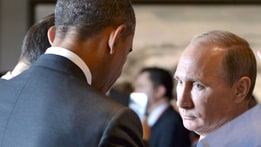Something About This Russia Story Stinks
Nearly a decade and a half after the Iraq-WMD faceplant, the American press is again asked to co-sign a dubious intelligence assessment

In an extraordinary development Thursday, the Obama administration announced a series of sanctions against Russia. Thirty-five Russian nationals will be expelled from the country. President Obama issued a terse statement seeming to blame Russia for the hack of the Democratic National Committee emails.
RELATED
"These data theft and disclosure activities could only have been directed by the highest levels of the Russian government," he wrote.
Russia at first pledged, darkly, to retaliate, then backed off. The Russian press today is even reporting thatVladimir Putin is inviting "the children of American diplomats" to "visit the Christmas tree in the Kremlin," as characteristically loathsome/menacing/sarcastic a Putin response as you'll find.
This dramatic story puts the news media in a jackpot. Absent independent verification, reporters will have to rely upon the secret assessments of intelligence agencies to cover the story at all.
Many reporters I know are quietly freaking out about having to go through that again. We all remember the WMD fiasco.
"It's déjà vu all over again" is how one friend put it.
You can see awkwardness reflected in the headlines that flew around the Internet Thursday. Some news agencies seemed split on whether to unequivocally declare that Russian hacking took place, or whether to hedge bets and put it all on the government to make that declaration, using "Obama says" formulations.
The New York Times was more aggressive, writing flatly, "Obama Strikes Back at Russia for Election Hacking." It backed up its story with a link to a joint FBI/Homeland Security report that details how Russian civilian and military intelligence services (termed "RIS" in the report) twice breached the defenses of "a U.S. political party," presumably the Democrats.
This report is long on jargon but short on specifics. More than half of it is just a list of suggestions for preventive measures.
At one point we learn that the code name the U.S. intelligence community has given to Russian cyber shenanigans is GRIZZLY STEPPE, a sexy enough detail.
But we don't learn much at all about what led our government to determine a) that these hacks were directed by the Russian government, or b) they were undertaken with the aim of influencing the election, and in particular to help elect Donald Trump.
The problem with this story is that, like the Iraq-WMD mess, it takes place in the middle of a highly politicized environment during which the motives of all the relevant actors are suspect. Nothing quite adds up.
If the American security agencies had smoking-gun evidence that the Russians had an organized campaign to derail the U.S. presidential election and deliver the White House to Trump, then expelling a few dozen diplomats after the election seems like an oddly weak and ill-timed response. Voices in both parties are saying this now.
continued----
----

0 Comments:
Post a Comment
Subscribe to Post Comments [Atom]
<< Home